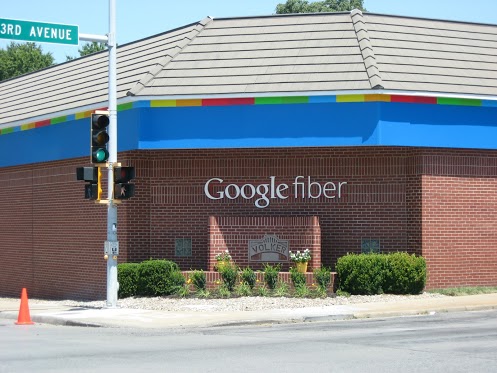
Close your eyes and picture the city of the future.
If you’re like me, you see the Jetsons. Flying cars, robot maids, holograms -the standard stuff. Or perhaps your vision is a bit darker, venturing into the territory of Fritz Lang’s Metropolis, a place populated by industrialist towers and a proletariat city chugging in the relative darkness beneath.
When you imagined the city of the future, you almost didn’t have the same thing in mind as Google: Kansas City.
__________________
Check out the most popular article on Cantech Letter right now: “Why Critics Love to Hate Elon Musk”.
____________________
Kansas City, both on the Missouri side and the Kansas side (and the suburbs of Westwood, Westwood Hills and Mission Woods), was Google’s choice to launch Google Fiber, an experimental broadband internet network infrastructure that uses fiber-optics. In September of last year, Google plugged in the network and offered residents of the city free broadband internet option, a one gigabit-per-second option for $70 per month, and a third option that included television service for $120 per month.
The service is light years ahead of what most Americans get. In 2012, the average U.S. broadband speed was just 6.6 megabits-per-second.
Google chose Kansas City after a contest that drew the interest of more than 1100 U.S. cities, including Topeka, Kansas, which temporarily renamed itself “Google”, and Greenville, South Carolina, which provided glow sticks to its residents to spell out the phrase “The World’s First and Largest People-Powered Google Chain.” One city, Duluth, Minnesota, even jokingly offered that every first-born child “…will be named either Google Fiber or Googlette Fiber”.
Milo Medin, Google’s vice president of access services, explained why Kansas City came out on top.
“Why did we pick Kansas City?” asked Medin, aloud. “We wanted to find a location where we could build quickly and efficiently. Kansas City has great infrastructure. And Kansas has a great, business-friendly environment for us to deploy a service. The utility here has all kinds of conduit in it that avoids us having to tear the streets open and a bunch of other stuff that really differentiates it from other places in the country.”
But Forbes writer Elise Ackerman was more plaintive. She says Google chose Kansas City because local officials “promised to get out of the media giant’s way.”
“They didn’t dangle tax breaks,” said Ackerman, but they did deliver access to public rights of way, expedite the permiting process, offer space in city facilities and provide assistance with marketing and public relations.”
A few weeks ago, The Financial Post’s Matt Hartley reported that Google Canada had listed job postings related to Google Fiber on LinkedIn. While the notices ” should not be taken as an indication that the Silicon Valley company is making plans to roll out the service in Canada” he said, one can’t wonder if Waterloo, home of Research in Motion, The Perimeter Institute, The University of Waterloo, and nearly 1000 tech startups would be a natural fit.
But those who believe that Canada’s tech triangle would be a slam dunk for a Google Fiber expansion into Canada should remember the lesson of Kansas City. Your region is tech-savvy? Good. You have a reputation for innovation? Terrific, get in line. Google’s oddball choice means those responsible for seemingly mundane permits, regulations and municipal policy will have at least as much of a say as anyone else will.
Is it worth it? Ask the guy who just downloaded “The Bourne Legacy” in fourteen seconds.
________________
Comment
Leave a Reply
You must be logged in to post a comment.




 Share
Share Tweet
Tweet Share
Share




Multiple times in the article you incorrectly state download speeds as gigabytes/megabytes when the correct measurement is gigabit/megabit. There is a huge difference between the two (8 times smaller).
Thanks for spotting that Alex. It was an error and we made the change.
Bring Google Fiber to Calgary!!!
Bring google fibre to Olds, ALberta! No wait, we already have OLDS FIBRE! o-net.ca. Local community owned and operated fibre optic network, deliverying base speeds of 100mbps down and 5mbps up, and thats just the minimum! o-net.ca. You should write an article on that!